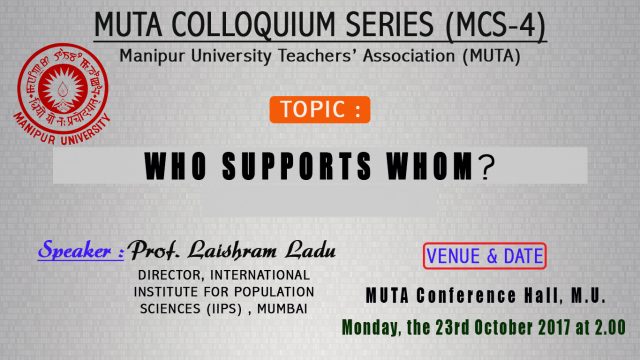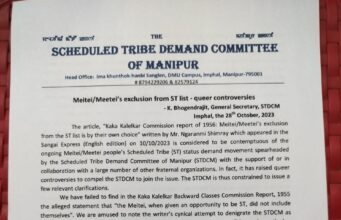You are cordially requested to attend the fourth MUTA COLLOQUIUM SERIES (MCS-4), organized by Manipur University Teachers’ Association (MUTA), which will be held on 23rd October 2017 at MUTA Conference Hall, M.U.
at 2.00 p.m.
Topic:
WHO SUPPORTS WHOM?
By Prof. Laishram Ladu
Director, International Institute for Population Sciences (IIPS) , Mumbai
ABSTRACT: From birth until death human being need goods and services throughout the lifecycle for survival. Goods and services relates to food, education, healthcare, housing and other infrastructure facilities including defense service. For an economy these goods and services are categorized into public and private sectors on the basis of whether funding is at government or household level. During the productive period individual generate income and spend for goods and services while the surplus income either invested for future consumption or use to support dependents. While in economically inactive unproductive stages of life individuals are supported by familial and public transfers and asset reallocation. Flow account measures all flows of services and goods of an economy in monetary value during the specified accounting period. Public policy outlines the regulations of goods and services to be provided to individuals of different age and its monetary value varies from economy to economy. At the household level, the nature of goods and services transfer to economically unproductive children and elders are governed by social values and norms of the society and monetary value of transfer depends on disposable income and social contracts between household members. An elicited concerned of developing countries as a consequence of increase in life expectancy and declining family size is about the capacity of families to sustain the support of older members during the process of rapid demographic change. Besides, earning household members have the dual responsibility of bringing up dependent children and supporting elderly parents. In developed economies where state-based or market based alternatives for economic support is prominent, the role of familial transfer is not very significant as in traditional developing countries.
In view of the foregoing oration it is proposed to provide an assessment of the interplay of public and familial support systems in meeting financial needs for food, education and healthcare of especially elderly and children. Further attempt shall also be made to assess how post 2005 policy reforms have alter the support system in India.
Dr. Khundrakpam Binod Mangang
Convener, MUTA Colloquium Series
Manipur University Teachers’ Association (MUTA)












